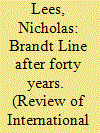| Srl | Item |
| 1 |
ID:
179321


|
|
|
|
|
| Summary/Abstract |
The Brandt Line is a way of visualising the world that highlights the disparities and inequalities between the wealthy North and the poorer Global South. Forty years after its popularisation as part of a call for global reform, is the Brandt Line now a misleading way of representing world politics? This article assesses whether the Global South has lost its distinctiveness and coherence relative to the North since 1980. Existing assessments of global inequality do not settle the question of whether the North–South divide remains relevant for international relations because they overlook the most politically significant measures of inequality. Drawing on power transition theory, this article provides a systematic assessment of the North–South divide in terms of levels of economic development, relative inequality, economic power, and political satisfaction. The evidence suggests that the Brandt Line is largely intact. Although the economic diversity of the South has increased and its collective economic power has risen, relative income rankings remain unaltered and the states of the Global South are as dissatisfied as they were four decades ago. Differential growth rates are reshaping world politics without eroding the North–South divide traced by the Brandt Line.
|
|
|
|
|
|
|
|
|
|
|
|
|
|
|
|
| 2 |
ID:
157881


|
|
|
|
|
| Summary/Abstract |
Member states of the United Nations (UN) agree that its development system needs substantial reform given its fragmentation and outdated structures, as well as new demands from the 2030 Agenda. Yet, a recent two-year reform process yielded no substantial reform decisions. Why did member states fail to endorse the necessary reforms despite almost unanimous recognition of the need for change? This paper describes member states’ conflicting positions on reforming the UN and analyses their failure to delegate authority to the UN development system. North and South, donors and recipients, are locked in a struggle for power and control, maximising bilateral influence at the expense of the benefits of multilateral cooperation. The paper contributes to the pool of UN studies, adding a decidedly political perspective of the reform process. It is based on diplomatic statements, negotiation drafts and interviews with UN diplomats.
|
|
|
|
|
|
|
|
|
|
|
|
|
|
|
|